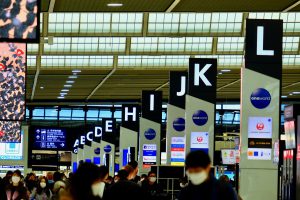The number of cases and deaths from coronavirus continued to climb this week, with new confirmed cases surging to around 200,000 a day. Because of the rapid increase in new cases, a draft government report has predicted that deaths will soon rise to about 3,000 a day. So far, governors have introduced phases for slowly opening up their states, while some states like Georgia, Alabama, South Carolina, and Florida have already begun to re-open. Because of the new predictions and the rapid reopening of some states, many fear that the crisis will only get worse. In order to try and slow down the spread, people are still required to practice social distancing and wear masks when they leave their houses.
![]()
Georgia Reopens
Many governors across the country have begun to reopen their states this week, despite fears that reopening will cause a spike in coronavirus cases. Although it was one of the last states to shut down, Georgia has begun to allow dine-in restaurants, salons, gyms, and other businesses to reopen. Smartphone data shows out-of-state visitors have begun flocking there: in the first week of Georgia’s reopening, an additional 62,440 visitors arrived there each day.
New Model Predictions
The new model created by the White House is now predicting a total of 134,000 people in the U.S. could die from Coronavirus. This is nearly double its previous prediction. According to CNN, the model from the Institute for Health Metrics and Evaluation at the University of Washington, had predicted 72,433 deaths as of the morning of May 4.
New TSA Guidelines

The Transportation Security Administration (TSA) has announced that they will require employees to wear facial protection at security checkpoints. They acknowledge that it is difficult to practice social distancing at security checkpoints, and they are hoping to make things safer by requiring masks.
“TSA is making this change to protect our employees and travelers as social distancing cannot always be maintained in the screening process.” TSA Administrator David Pekoske said in an accompanying statement.
Many airlines, including American, United, Delta, Southwest, Alaska, Frontier, JetBlue and Spirit, have announced plans to make face masks mandatory for passengers.
More Than 66% Of New Cases in NY Are People At Home
The number of covid-19 hospitalizations has remained steady in the state of New York, and surprisingly, 66% of cases were people who stayed home.
“We were thinking that maybe we were going to find a higher percentage of essential employees who were getting sick because they were going to work, that these may be nurses, doctors, transit workers,” Cuomo said. “That’s not the case, and they were predominantly at home.”
However, the number of deaths in the state has begun to decline, and the governor is hopeful that the numbers will continue to go down. On May 7, there were 232 deaths in the state, compared with a peak of around 800 a day a few weeks ago. New York City, one of the state’s hotspots, is currently trying to reduce the number of infections by using UV light to try and kill the virus on the subway.
Trump Battles CDC Over Reopening Guidelines

As Trump pushes to reopen the economy, a battle between the White House and the CDC has erupted. While The CDC has put out guidelines for child care programs, schools, churches, restaurants and bars, and mass transit administrators, including using disposable utensils, closing every other row of seats on buses and subways, and even restricting travel to areas with high infection levels, the White House has rejected these recommendations. The White House has cited concerns that these recommendations could infringe on religious rights and cause further damage to the economy.
Nearly Everyone Who Gets Coronavirus Makes Antibodies
A new study has found that nearly everyone who gets infected with the coronavirus will eventually make antibodies to the virus. According to the study, the age and sex of the patient did not matter, nor did the severity of the illness.
“The question now becomes to what extent those are neutralizing antibodies, and whether that leads to protection from infection — all of which we should presume are yes,” said Sean Whelan, a virologist at Washington University in St. Louis.
